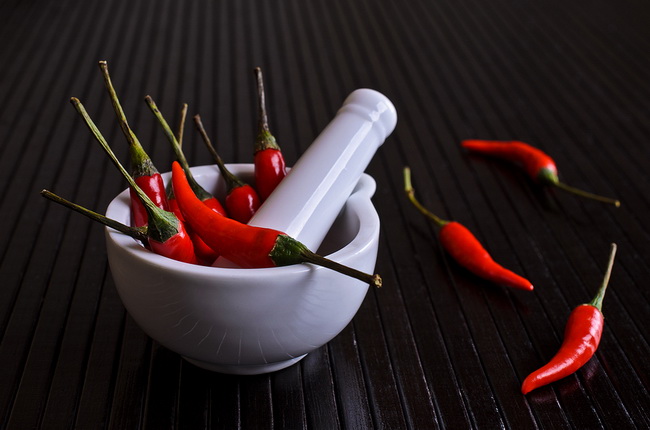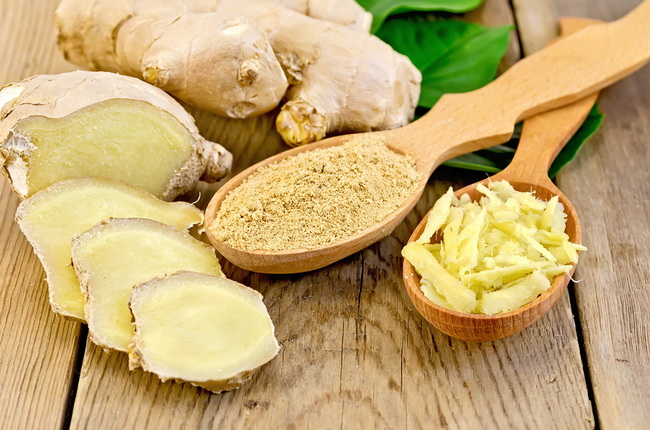- Make It Yourself Lavender Heart-Shaped Bath Bombs!
- 20 Things You Never Knew About “Down There”
- 12 Best Foods For Those Suffering From Arthritis Pain
- 12 Personal Hygiene Mistakes Almost Everyone Makes (Mom Never Told You About #4!)
- 15 Medicinal Plants And Herbs From The Cherokee People
- 12 Mind-Blowing Benefits Of Drinking Coconut Water During Pregnancy
- 12 Outstanding Winter Foods That Won’t Fatten You Up Like A Christmas Turkey
Top 10 Super Strong Herbs to Stop Migraine Headaches

Photo credit: bigstock.com
For those who have never experienced a migraine headache, it’s easy to just write them off as being figments of someone’s imagination. Many think that the affected person is looking for attention or that they are a exaggerating. However, for those of you who are familiar with the excruciating pain, the nausea, vomiting, the over sensitivity to sound or light, you know that migraines are no joke.
Certain things are known to trigger migraines, although they aren’t the same for everyone. Common triggers include certain foods, medications, alcohol, stress, cigarette smoke, coffee, or even just bright or flashing lights can bring on an episode.
The National Institute of Neurological Disorders estimates that more than 30 million Americans suffer from migraines and seek relief through prescription drugs. However, those who suffer from migraines state that, despite their medications, they still cannot function during a migraine attack and that these prescriptions come with severe side effects.
The actual underlying cause of migraines is still not completely understood but some studies have found that more than 50 percent of those who get migraines are deficient in magnesium. So your first step should be to get plenty of magnesium via foods and supplements. Foods that are high in magnesium are leafy green vegetables, nuts, beans, and seeds.
Since there is plenty of financial gain to be had from migraine sufferers, it should come as no surprise that there has been very little actual research done in the area of herbal solutions. However, we have compiled a list of 10 of the top herbs that do have some research behind them to back up claims that they work against migraines.
Always consult your doctor before beginning any herbal program, especially if you are taking prescription drugs, are pregnant or if you are breastfeeding.
1. Feverfew
Although this is a well-known and long used herb for fighting fevers, which is how it got its name, it is also one of the most effective herbs for fighting migraines. The active ingredient in the leaves and flowers, parthenolide, stop the brain from making chemicals that cause the blood vessels to dilate. Studies show that feverfew can reduce the severity as well as the frequency of migraines. One study showed that when subjects stopped taking a feverfew supplement, which was switched with a placebo without their knowledge, they reported a significant increase the number of migraines, as well as the severity of the headaches. In one large study, feverfew was shown to decrease the number of migraines by as much as 24 percent. Some people have stated that they find relief by making a tea containing a mixture of feverfew and bay leaves.
2. Peppermint
Menthol, the active ingredient in peppermint, has been used for centuries to stop pain, including headaches. One study, performed in 2010, showed that menthol was much more effective than a placebo and can work well as a means of a safe therapeutic alternative for the treatment of migraines. Peppermint essential oil is helpful for migraine headaches due to its cooling properties. Try a cup of peppermint tea or smell peppermint essential oil when you have another migraine attack for some sweet smelling relief.
Continue to Page 2

Photo credit: bigstock.com
3. Cayenne Pepper
Scientists believe that the active ingredient in cayenne, capsaicin, can provide some relief from the pain of migraines by actually masking some of the pain or perhaps by increasing your pain threshold. You will find cayenne in many nasal sprays and many people find relief in using these products to stop or lessen their pain.
4. Butterbur
Butterbur has recently gained a great deal of attention due to a blind study which confirmed that this herb could both prevent and reduce migraines. Butterbur has both anti-inflammatory and anti-spasmodic compounds, which were tested in 2004. In this study, more than 240 subjects stated that they found relief from the pain of migraines after consuming butterbur supplements. The number of attacks was reduced by 28 percent in the placebo group, but a whopping 58 percent in the group that consumed butterbur. Another study showed that 82 percent of subjects reported that they had significant improvements in their migraine headaches after regular consumption of butterbur.
5. Valerian
Valerian, an herb native to Europe and Asia, has shown great promise for helping with a wide range of health issues including anxiety attacks, chest pain, cardiovascular problems, and insomnia. Valerian works indirectly, targeting anxiety, which is one of the major causes behind migraine headaches. Valerian also contains sedative compounds, which help bring deep, quality sleep, which can help migraine sufferers feel better.
6. Willow Bark
This ancient herb, used for thousands of years, has been used for the treatment of inflammation and pain, including the pain of migraine headaches, The University of Maryland Medical Center conducted a study which showed that salicin, a compound found in willow bark and works in a similar manner to aspirin, can help those who suffer from migraines.
Continue to Page 3

Photo credit: bigstock.com
7. Ginger
Ginger root is one of the most effective treatments for migraine headaches. Ginger helps to relieve swelling, pain, and tension, as well as to stop the nausea and vomiting that often accompanies these painful headaches. Try making some ginger tea for some natural relief from the pain and nausea of your next migraine.
8. Rosemary
This culinary herb is well known in aroma therapy and has recently been shown to be beneficial in the treatment of migraine headaches. One natural remedy that appears to work very well for people involves a mixture of essential oils from rosemary, peppermint, lavender, and eucalyptus oil. Rosemary is thought to work because it is known for improving circulation, which can help relieve the pain of migraines.
SEE ALSO: 10 Types of Headaches and What to do About Them
9. Lemon Balm
Lemon balm is well-known for its relaxing compounds and is often sold as a tea. Lemon balm is a natural vasodilator, which means it opens up the blood vessels, which can help to relieve the pain of migraine headaches. Lemon balm, combined with nutmeg and cinnamon and other sweet smelling herbs, was one of the main ingredients in a tonic sold during the 14th century used to treat neuralgia and headaches of all types.
10. Gingko Biloba
Gingko has been shown in numerous studies to improve oxygen and blood flow to the brain, improving brain function and relieving headaches at the same time. Ginkolide B, an extract in gingko biloba, has shown that it can prevent inflammation and has anti-platelet activity. Gingko has been shown to decrease the need for medication in most people who suffer from frequent migraines.
References:

































